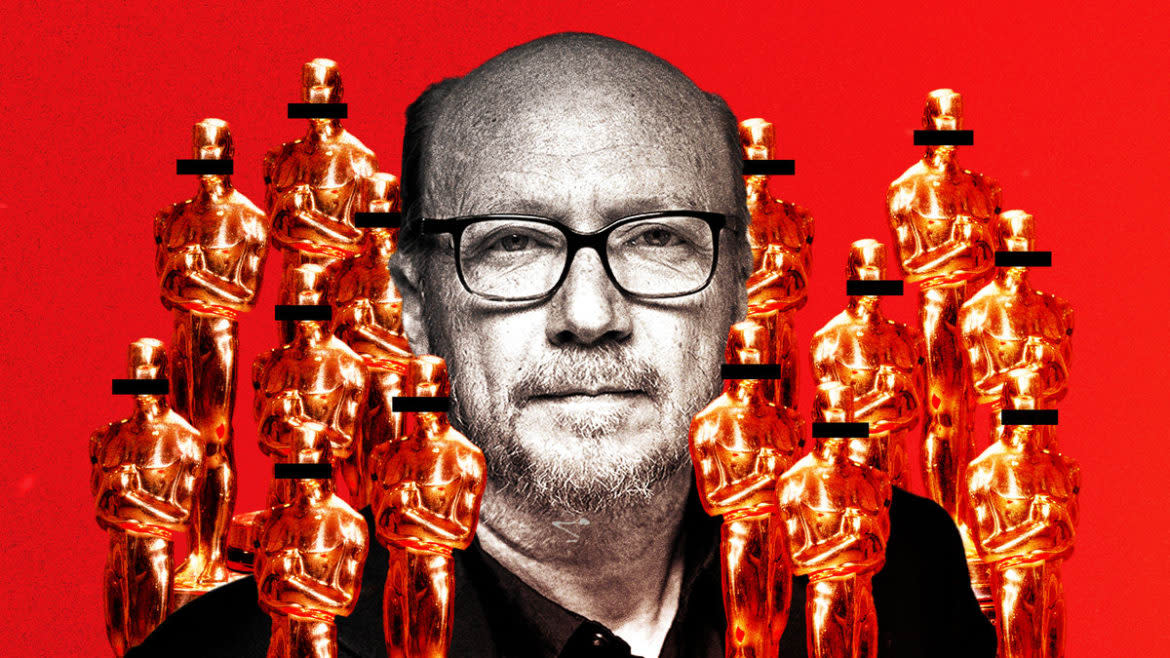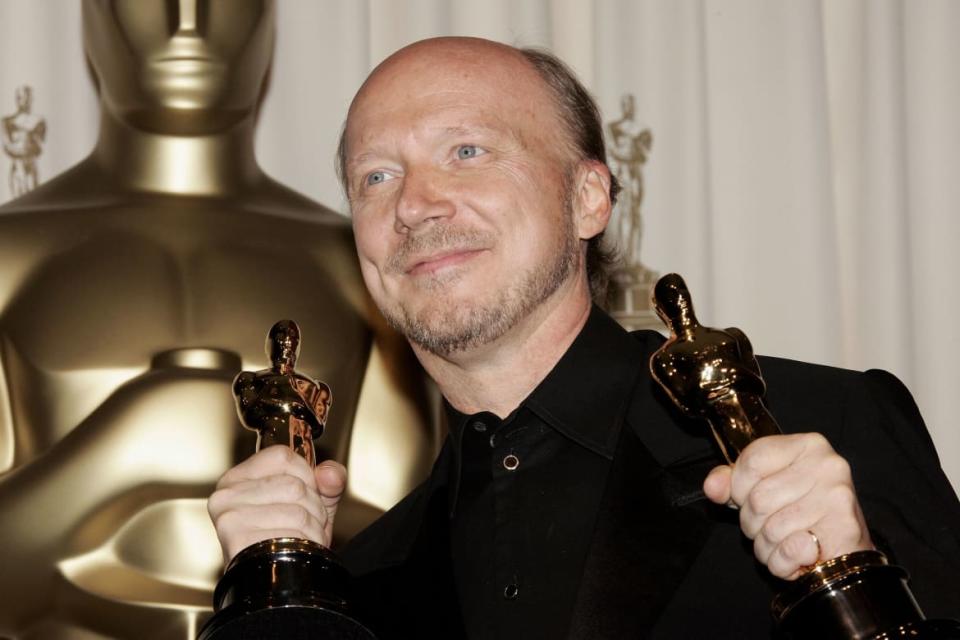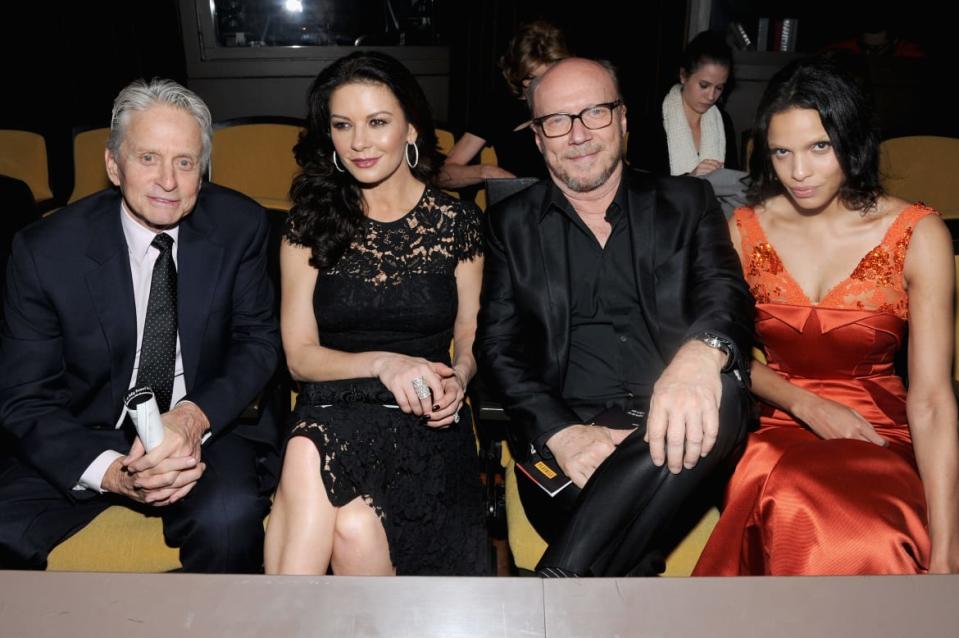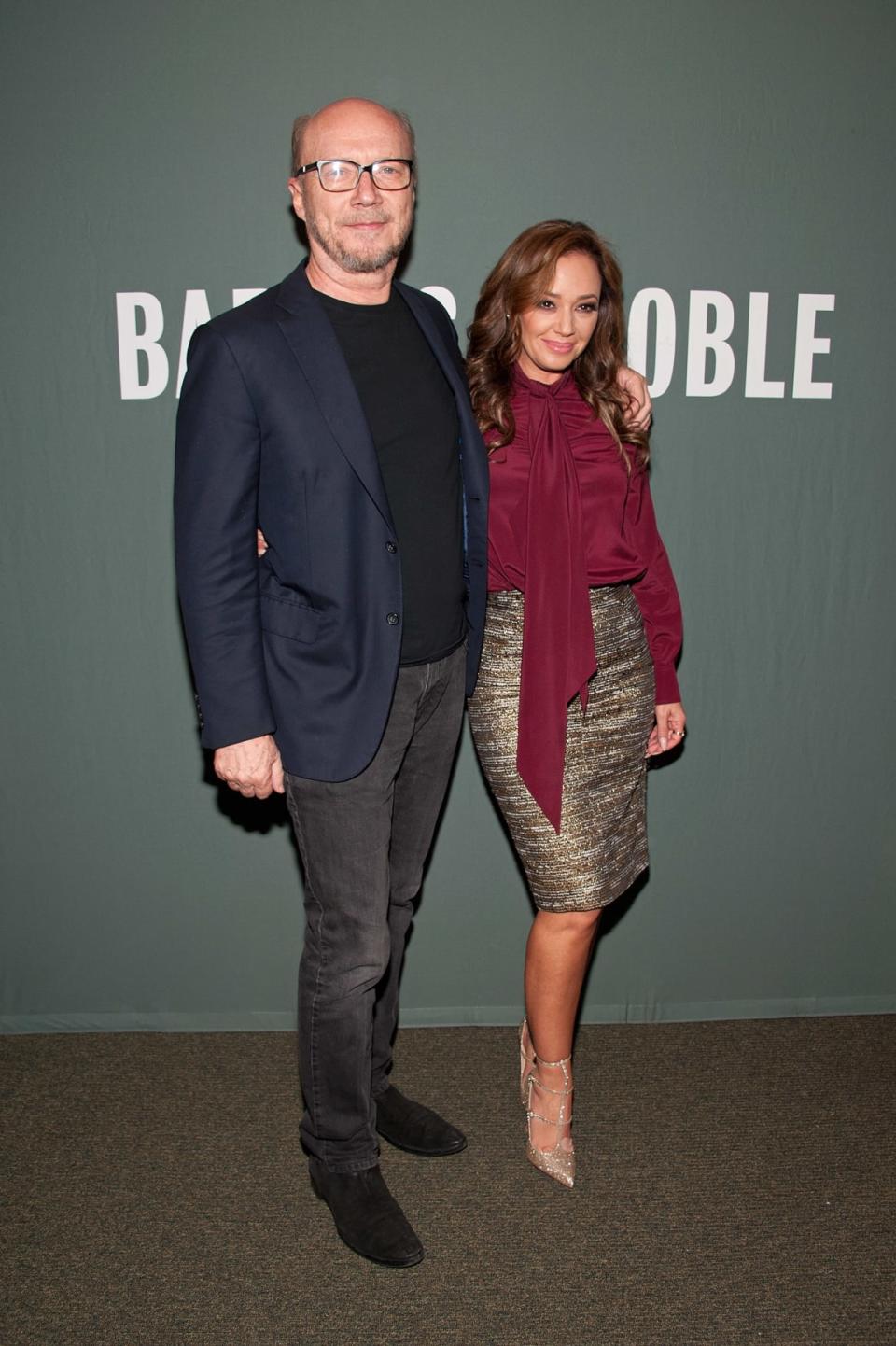Hollywood’s Silence on Oscar Winner Paul Haggis Is Deafening

- Oops!Something went wrong.Please try again later.
More than a month after director Paul Haggis was found liable of raping a woman in his SoHo loft in 2013, Hollywood has largely remained silent on the civil court ruling.
In November, Haggis was found liable of sexually assaulting publicist Haleigh Breest in his luxury penthouse following a Manhattan film premiere a decade ago. Breest was awarded $10 million, including damages, in the civil suit. Haggis is attempting to appeal the decision.
The two-time Oscar-winner’s legacy now hangs in the balance. In November, after Haggis lost his civil case, the Academy of Motion Picture Arts and Sciences said it’s reviewing possible disciplinary action against Haggis. That review is still in progress, the Academy told The Daily Beast.
“The Academy is addressing this matter according to our Standards of Conduct and the due process requirements under California nonprofit corporation law,” the Academy of Motion Picture Arts and Sciences said in a cryptic statement sent to The Daily Beast.
An Academy spokesperson declined to comment on the extent of any possible discipline or a rough timeline as to when a decision could be reached. Haggis could be banned from the Academy for a period or have his membership revoked altogether. However, the Academy has only issued five expulsions in its 93-year history and no member has ever been stripped of their Oscar.
Harvey Weinstein, Bill Cosby, Roman Polanski and cinematographer Adam Kimmel have all been expelled from the Academy for sex crimes. All four men were convicted or were found guilty of sexual misconduct. Cosby, who was sentenced to several years in prison by a Pennsylvania court in 2018 for drugging and sexually assaulting a woman at his home in 2004, however, was freed on appeal in June 2021.

Writer/Director Paul Haggis backstage with his Oscar statuettes for Best Original Screenplay and Best Motion Picture for the film Crash in 2006.
On Monday, Weinstein, 70, was convicted in Los Angeles of raping one woman—his second sexual assault trial—after a New York jury in 2020 found him guilty of raping an actress and publicist.
Haggis’ case, however, is different from Weinstein, Cosby, Polanski and Kimmel’s in that he was found liable of rape in civil court, not criminal. It’s unclear if the legal distinction will have any bearing—in contrast to how the Academy has treated criminal sexual misconduct in the past — when it comes to Haggis.
Four other women also came forward accusing Haggis of sexual misconduct after Breest filed her lawsuit. They either testified or had sworn depositions played in court during his civil trial. Haggis’ lawyers, however, complained that three of the four Jane Does’ testimony, which was captured via a recorded deposition that was played in court, was not held to the same evidentiary standard as live trial testimony.
In the wake of the #MeToo movement, the Academy established a Standards of Conduct, which may help guide the board’s pending decision on Haggis.
The code of conduct dictates that members are expected to “behave ethically by upholding the Academy’s values of respect for human dignity, inclusion, and a supportive environment that fosters creativity.”
“There is no place in the Academy for people who abuse their status, power or influence in a manner that violates recognized standards of decency,” the code states. “The Academy is categorically opposed to any form of abuse, harassment or discrimination on the basis of gender, sexual orientation, race, ethnicity, disability, age, religion, or nationality.”
While the Academy continues to mull what action, if any, it will take against Haggis, it should be noted that Will Smith was banned for 10 years from attending the Oscars after he slapped Chris Rock, while Godfather Part II actor Carmine Caridi became the first actor to be banned back in 2004 when he was caught sharing screeners of movies that were later bootlegged.
At trial, the Canadian screenwriter suggested he’d been blacklisted by Hollywood, bemoaning how job offers had dried up after allegations against him surfaced. He added that lawyer fees had nearly bankrupted him.
Haggis’ last major film credit was producing and directing the 2018 documentary 5B, alongside cinematographer Dan Krauss. The film, which delved into the 1980s AIDS epidemic in San Francisco, premiered at the 2019 Cannes Film Festival. Cannes later removed Haggis’ name from press materials for the documentary 5B, which the filmmaker made after the sexual assault allegations involving Breest became public. The film, which received widespread praise, still boasts a 100 percent rating on Rotten Tomatoes.
No celebrities in Haggis’ immediate orbit have publicly disavowed him as of yet.

(L-R) Actors Michael Douglas, Catherine Zeta-Jones and director Paul Haggis attend the opening of the Mica and Ahmet Ertegun Atrium at Lincoln Center in New York City, December 2015.
It’s unclear whether power couple Catherine Zeta-Jones and Michael Douglas, who were in attendance of the Side Effects screening alongside Haggis hours before the alleged sexual assault of Breest occurred, will continue to support the screenwriter. During Haggis’ testimony, he described Zeta-Jones as a “close friend.”
Ben Stiller and Susan Sarandon, who co-chair Haggis’ Artists for Peace charity, which he resigned from in 2018 amid the sexual misconduct allegations, have equally been mum.
Actress Leah Remini, who testified in defense of Haggis at his trial, has failed to say anything about her friend’s defeat in his civil rape trial.
Haggis, a former celebrity Scientologist, argued at trial that the Church of Scientology had surreptitiously manufactured the case against him as part of a long-held vendetta over the Canadian filmmaker’s public defection from the controversial religion in 2009.
Remini, a former Scientologist and fierce critic of the religion, described Haggis as a “caring,” “warm,” and “funny,” person who “cares deeply about the underdog.” She framed Haggis as a victim of Scientology in the sexual assault case. Remini also testified that the sexual assault allegations leveled at him by five separate women had no bearing on her opinion of Haggis.
The Daily Beast has reached out to Remini for comment.

Leah Remini (R) poses with Paul Haggis while promoting her book Troublemaker: Surviving Hollywood and Scientology in November 2015.
Mike Rinder, a former Scientology spokesperson, and co-host of Remini’s Fair Game podcast, also testified in defense of Haggis at trial, labeling him as one of the top-three enemies of the church.
Breest and her attorneys repeatedly denied any connection to the Church of Scientology throughout Haggis’ trial. Church officials told The Daily Beast it was not surprised that the jury did not believe Haggis.
“None of this surprised us, because we know his character and know firsthand that he’s a liar, because he blatantly lied about us. In other words, again, we told you so,” the Church of Scientology said in a statement.
“It is not the Church’s concern what Hollywood does with Haggis,” the church said. “That is up to Hollywood, and whether it wants to be associated with someone who a jury unanimously concluded raped a young woman… regardless of how Hollywood treats Haggis going forward, we know we were right about him the whole time. From the very beginning we said Haggis is a self-centered fabulist who scripts his made-up version of reality while hiding his evil deeds.”
Oscar Winner Paul Haggis Fights Verdict in Civil Rape Case
If anything, the repercussions in Haggis’ hometown of London, Ontario, Canada—2,400 miles northeast of Los Angeles—have been much swifter.
Since Haggis was found liable of rape, the southern Ontario city of 422,000, has embarked on a campaign to distance itself from the embattled screenwriter, quietly erasing him from monuments and education funds in his name.
On Dec. 13, London’s 14 city councilors unanimously voted to rename Paul Haggis Park.
“We continue to put words into action and not honor former Londoners who are found guilty of sexual assault,” Councillor Elizabeth Peloza, the architect of the civic motion, wrote on Twitter after the motion passed.
Peloza, who represents London’s 12th Ward, lives blocks away from the public space and often visits with her three children. She described Haggis’ alleged actions as “horrible” and “disgusting.”
“When you think about naming stuff after people, that’s what you’re raising as an example and you’re extolling that person and essentially immortalizing them,” Peloza told The Daily Beast.
The sign bearing Haggis’ name was removed from the recreation site on Dec. 14. The city’s website also scrubbed any mention of the Haggis park. It’s unclear what the park, which sits at 2875 Bateman Trail in the city’s south end, will officially be renamed. London bestowed Haggis the honor in 2011.
Peloza cited London’s adoption of the United Nations Safe Cities Initiative action plan, which highlights “the issue of violence against women and girls in public spaces” as one of the core reasons she sought to remove Haggis’ name from the park.
“[Haggis’] recent civil verdict goes against what that policy represents and what I envision London being,” Peloza said.
Since allegations first surfaced against Haggis in 2017—at the outset of the #MeToo movement—the small Canadian city was initially torn on how to respond. The prospective name change caps a more than four-year effort by the city and community members to rename the park in Haggis’ name.
Paul Haggis’ name to be removed from London, Ont. park after unanimous council vote https://t.co/RzejK5azU2 pic.twitter.com/GtyUMcSSpS
— Global National (@GlobalNational) December 14, 2022
The civic initiative was re-energized in June when Haggis was arrested while attending a film festival in Italy on separate sexual assault allegations. An Italian judge ultimately dismissed the case. Haggis also denied those allegations.
While Haggis’ name might not ring a bell for many Londoners—he bolted to Hollywood more than 50 years ago—AnnaLise Trudell of London women’s shelter Anova said the name change is especially important for past victims of sexual violence.
“Here’s what’s at stake: every survivor in the city—and there would be tens of thousands of them in London—hears about this in the media, sees it when they walk through that park,” Trudell added. “What that link does—is it says, this is somebody we admire, we made something after them. And even though there are people who have been harmed by him, we’re going to continue because what he’s done otherwise is more important than the harm he’s caused. We’re at a point in society where that’s shifting.”
London’s Fanshawe Community College, where Haggis briefly studied in the early 1970s before dropping out, also said it was distancing itself with the Crash writer.
In 2006, the college awarded Haggis an honorary diploma and announced a scholarship in his name. The scholarship, in partnership with a local school district, was intended for prospective arts program students.
On Dec. 19, Fanshawe announced they’d officially cut ties with Haggis. A Fanshawe spokesperson confirmed that Fanshawe had “cancelled” the Haggis scholarship and was “immediately revoking” his honorary diploma.
“Fanshawe College strongly condemns any type of sexual violence,” Fanshawe Community College said in a statement sent to The Daily Beast. “All images and references to Mr. Haggis have been removed from the campus and the website.”
Neither Haggis nor his attorney Priya Chaudhry responded to multiple requests for comment from The Daily Beast.
Breest’s legal team has until Jan. 13 to file a response to Haggis’ latest motion supporting his appeal, at which point presiding Judge Sabrina Kraus will either deny the appeal motion or refer the case to an appellate court.
Get the Daily Beast's biggest scoops and scandals delivered right to your inbox. Sign up now.
Stay informed and gain unlimited access to the Daily Beast's unmatched reporting. Subscribe now.

